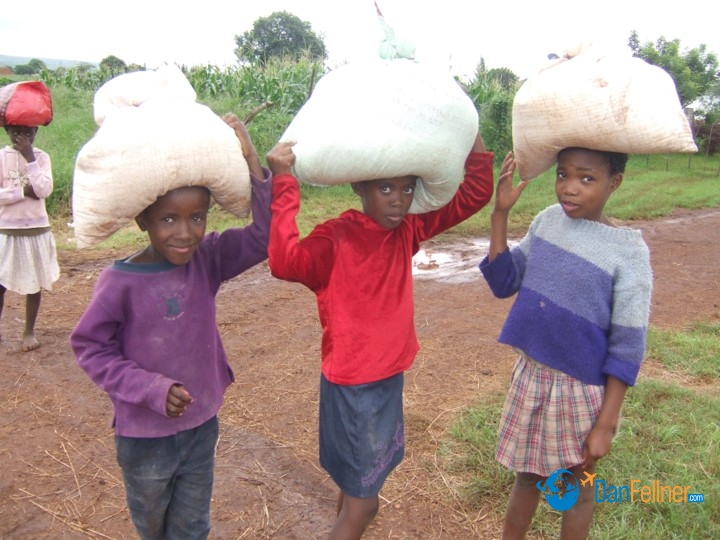It’s not easy to get to this small African kingdom
The Arizona Republic – March 4, 2009
LOMAHASHA, Swaziland — I had just returned to the Silversea Silver Wind after a day of sightseeing in Maputo, Mozambique, when the voice of Capt. Gennaro Arma came over the ship’s public address system.
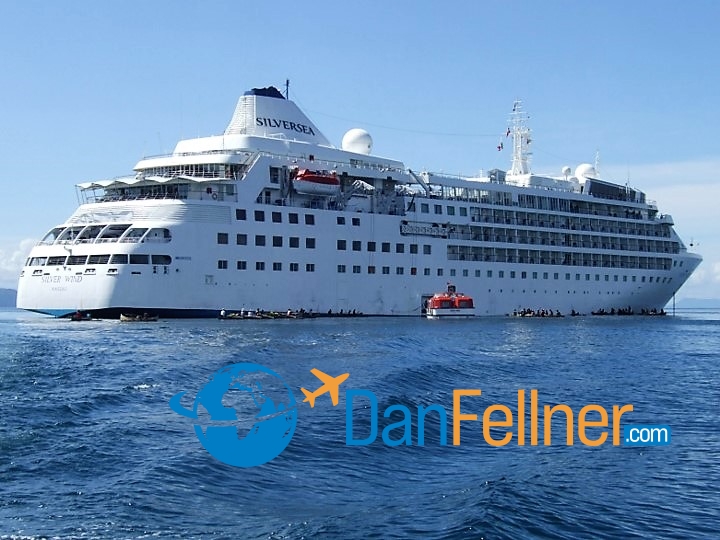
The Silversea Silver Wind anchored off the coast of Africa.
Along with about 200 other passengers, I was midway through a 16-day cruise on the luxurious Silver Wind, which started in Cape Town, South Africa, and ended in Mombasa, Kenya. Thus far, it had been an amazing cruise. I had seen lions, rhinos and zebras on mini-safaris during prior port stops in South Africa and learned more about the native Zulu culture.
In a thick Italian accent, Capt. Arma announced that there was a bad storm in the Mozambique Channel to the north, in the direction where we were scheduled to sail that evening. Therefore, the Silver Wind would be forced to stay docked in Maputo for another 24 hours.
One thought immediately popped into my head: Swaziland or bust.
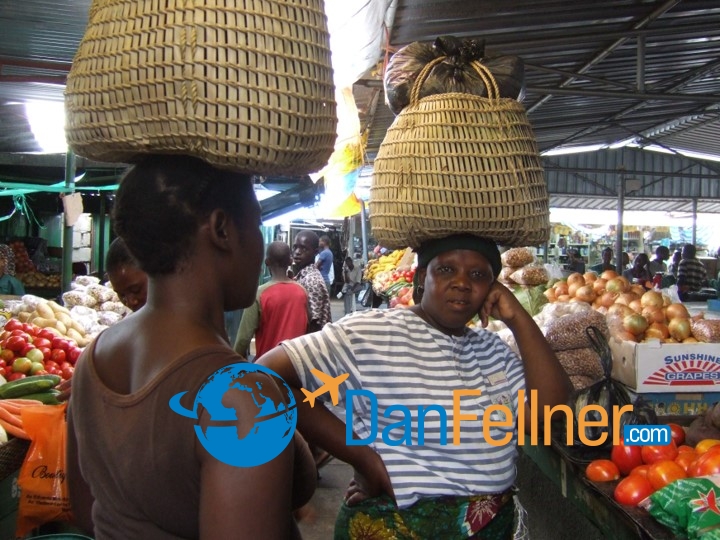
The market in Maputo, Mozambique.
I had wanted to visit the small Kingdom of Swaziland that day, only about 50 miles from Maputo, but was unable to find a reliable and reasonably priced car and driver to make the trip. Now with an unexpected extra day, I hoped I could make the necessary arrangements.
Why the fascination with Swaziland? Well, for one thing, there was something exotic about the name that had always intrigued me. And I knew it was one of the last remaining absolute monarchies in the world, meaning the King has complete power. Also, one day was more than enough to spend in Maputo, a congested city with few tourist attractions and pesky hawkers constantly in my face trying to sell tacky souvenirs.
Finally, it would be a chance to check another country off the list. I have long wanted to join a fairly exclusive group called the Travelers’ Century Club. To be eligible, you have to visit at least 100 countries. I’ve now been to more than 90 and a visit to Swaziland would get me one step closer to membership.
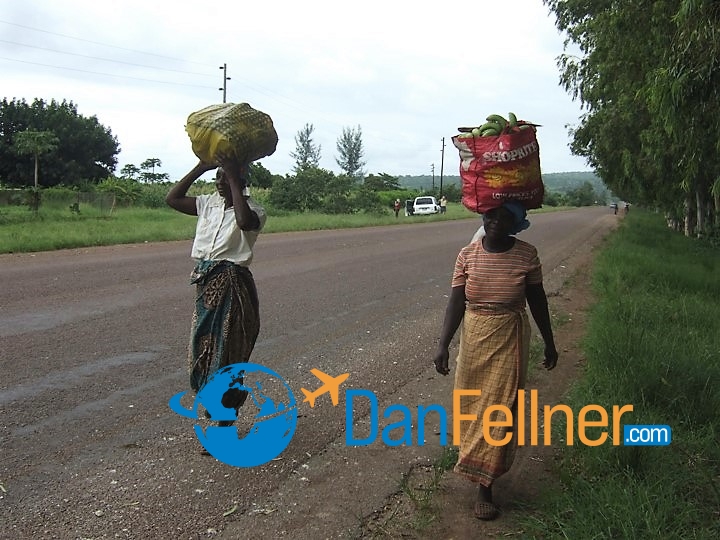
Mozambican women carrying produce on their heads on the road to Swaziland.
I approached Mr. Rudy, the local port agent on board. Did he know someone who could take me to Swaziland the following day? I told him it was essential that the car be reliable and comfortable and that the driver speaks good English. He nodded and said he would have the details for me the following morning.
I spent the evening trying to recruit fellow passengers to join me. There’s always safety in numbers and sharing the cost would be nice, too. After a bit of cajoling, I was able to get commitments from Linda, a retired accountant from Georgia (and a fellow country-counter), and Bob, an attorney from Illinois.
The next morning Mr. Rudy said he had lined up a reliable car and driver. “Of course,” he said, when I asked him if the driver spoke English. We agreed on the fare — $400 — which Linda, Bob and I would split.
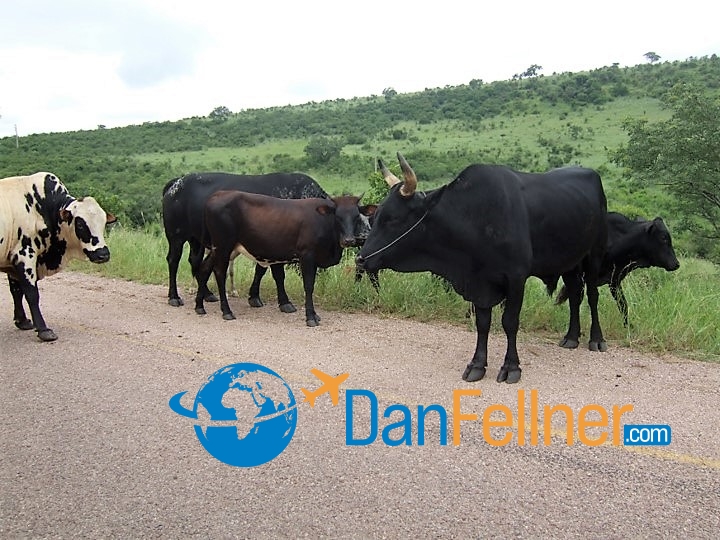
Traffic jam in Mozambique: Waiting for cows to cross the road.
As we left the ship at 10 a.m., we were reminded by a Silver Wind staff member that the ship would be sailing that afternoon for Madagascar at 5 p.m., with or without us. We only planned on a four or five-hour trip, so that gave us plenty of time to spare.
Mr. Rudy drove the three of us to the port entrance about a mile from the ship where Dudley, our driver, was waiting in a white Toyota four-door Land Cruiser. We were off on our adventure to Swaziland.
Or so we thought.
Dudley drove a few blocks through Maputo’s chaotic traffic and abruptly pulled into some sort of service station. The next thing I knew someone was adding oil to the engine and replacing a bald front left tire.
I looked around the vehicle. There were no seatbelts in the backseat (more a problem for Linda and Bob as I had grabbed the front seat next to Dudley), no air conditioning (temperatures that day were in the high 80s with humidity to match), and a cracked windshield with a wiper dangling from its holder like a broken twig. I think my window was the only one in the car that actually moved up or down.
This definitely did not appear to be a reliable and comfortable vehicle as Mr. Rudy had promised. From the backseat, Bob suggested that perhaps Mr. Rudy hadn’t deliberately misled us. By Mozambican standards, maybe this was a reliable and comfortable vehicle. Bob also suggested that we consider aborting the trip and scrap our sojourn to Swaziland.
But it was too soon to give up. I did voice my discontent to Dudley, who simply smiled and said, “It’s okay.” By now, the tire had been replaced and Dudley tried to start the engine but nothing happened. He yelled something out the window, two guys came over to give us a push, the Land Cruiser sprung to life, and once again, we were on our way.
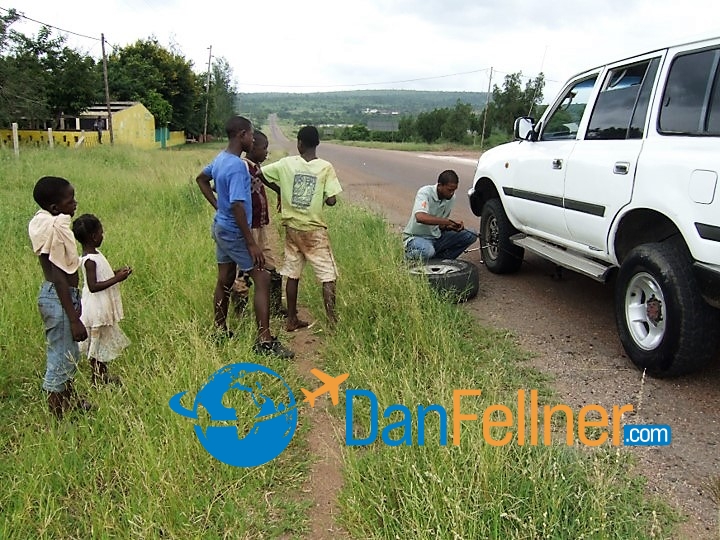
Dudley changes a tire, attracting a small crowd in the Mozambican countryside.
Not an auspicious beginning to our trip.
After another stop for gas, we were finally headed out of Maputo into the Mozambican countryside. But I checked my watch and it was already 11 a.m. Our unexpected stops had cost us an hour’s worth of precious time and we were only just underway.
As for Dudley’s English, that also left something to be desired — a lot, in fact. The longest sentence he was able to string together during the course of the day was, “I like Obama,” which he said with a huge smile when I asked him about the new American president.
But Dudley did understand the word “stop,” which we would utter from time to time so we could stop and take pictures along the way. I was especially fascinated by the site of Mozambican women carrying huge loads of produce in baskets on their heads as they walked along the side of the road. No wonder they all seemed to have such excellent posture.
One time, though, Dudley pulled the Toyota over without our prompting. He got out of the car and I heard him utter something that must have been a curse word in his indigenous language (Portuguese is the official language of Mozambique, reflecting the country’s history as a colony of Portugal, but a number of indigenous languages are also spoken, including Swahili).
I got out and took a look for myself. That same front left tire that had been replaced back in Maputo had gone flat.
Dudley got to work changing the tire. We were seemingly in the middle of nowhere, but within minutes, several children appeared to watch Dudley put on the spare. When you can’t afford an Xbox and video games, I guess this sort of thing makes interesting entertainment.
By now, the three of us were quite concerned. What if another tire would go flat? Dudley had already put on the spare.
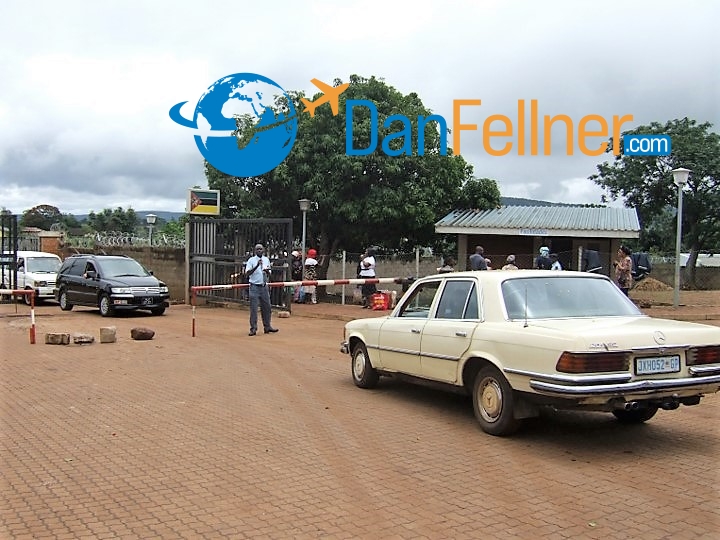
The Mozambican border town of Nemaacha.
I had visions of being stranded in the middle of nowhere at 5 p.m. while the Silver Wind sailed away. I had planned to eat in La Terrazza, the ship’s specialty Italian restaurant that night. Would the grilled veal I craved end up on someone else’s plate?
Also, it would most likely cost a fortune to fly to Nosy Be, a small island off the coast of Madagascar that was the Silver Wind’s next stop on our itinerary. In fact, did planes even fly there?
Undeterred, Dudley put the spare tire on and we were ready to resume our journey. Soon, the countryside changed from flat to mountainous, with lush green hills as we headed southwest to Swaziland. At one point we had to stop for a herd of cows to cross the road.
Sensing our apprehension about the time, Dudley picked up speed and as it was starting to drizzle, I got a bit nervous as the Land Cruiser negotiated the road’s twists and turns.
It was now past noon and Swaziland was still nowhere in sight. Finally, we drove into the Mozambican border town of Nemaacha, where vendors selling fruits and vegetable lined the roadside.
We pulled into the immigration office for what we hoped would be a perfunctory process. I had done some research and knew that Swaziland did not require a visa. But the problem was with the Mozambican side of the border. With our passports laid out in front of him, a border official was lecturing Dudley about something. Sternly shaking his head, he kept saying the same thing over and over again in a language we couldn’t understand.
“This couldn’t be good,” I said to Bob and Linda, wondering if it was time to consider deploying the universally used tool known to work at border crossings all over the world — the bribe.
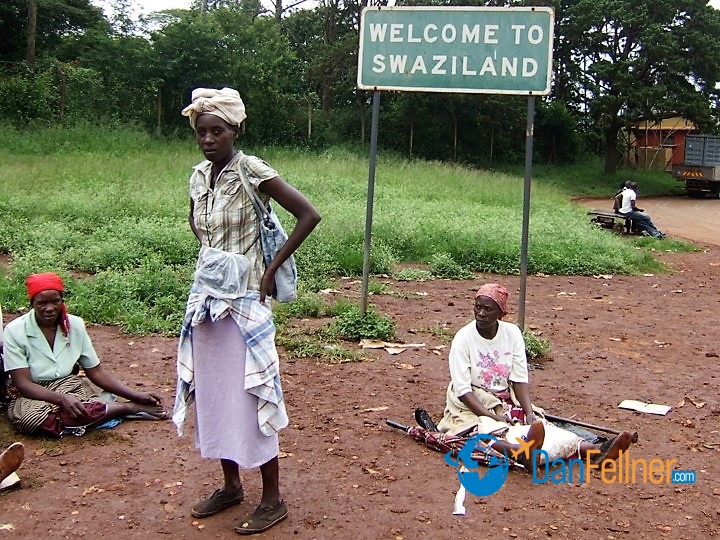
At long last, arrival in Swaziland!
Turned out that anything under the table was unnecessary, Dudley told us. We just needed to pay $25 each for the privilege of leaving Mozambique. We would also have to pay $25 to reenter the country.
This trip was starting to get expensive.
But we had cleared our last obstacle, and when the bar was raised at the border crossing to let the Land Cruiser drive onto Swaziland soil, I felt like Sir Edmund Hillary at the summit of Mount Everest, with Dudley as my Sherpa.
Swaziland, at last!
By now, though, with delays due to car problems, picture stops, cow herds and bureaucracy at the border, it was already time to head back to Maputo to catch our ship. We had time only to take a quick peek at Lomahasha, the Swazi border town.
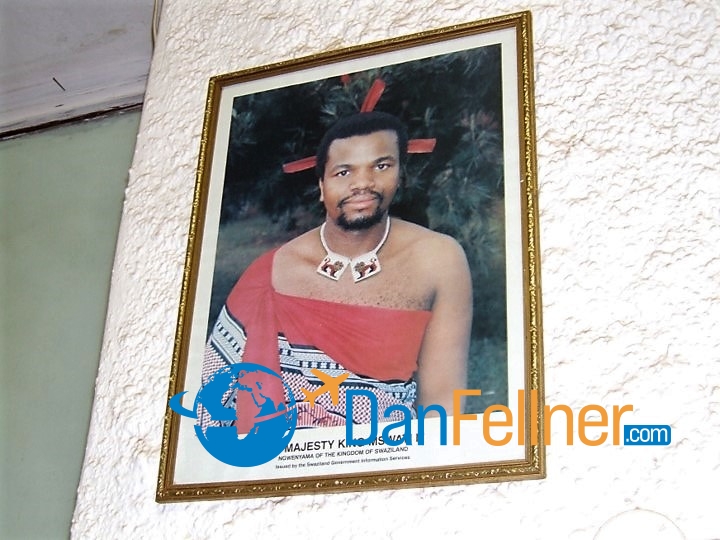
Portrait of Swaziland’s King Mswati on the wall of a Lomahasha shop.
We popped into a shop and saw a portrait of the ruler of Swaziland, His Majesty King Mswati III. He was born in 1968, four months before Swaziland became independent from Great Britain, and succeeded his father as absolute monarch in 1986.
From what I heard, the King, who has 14 wives and 23 children, has some pretty tough challenges to deal with in the country, including an HIV infection rate near 40 percent, highest in the world.
All told, we spent about 45 minutes in Swaziland. The only souvenirs we could find were some coins in the Swazi currency, known as the lilangeni. But Swazi t-shirts or fridge magnets were nowhere to be found.
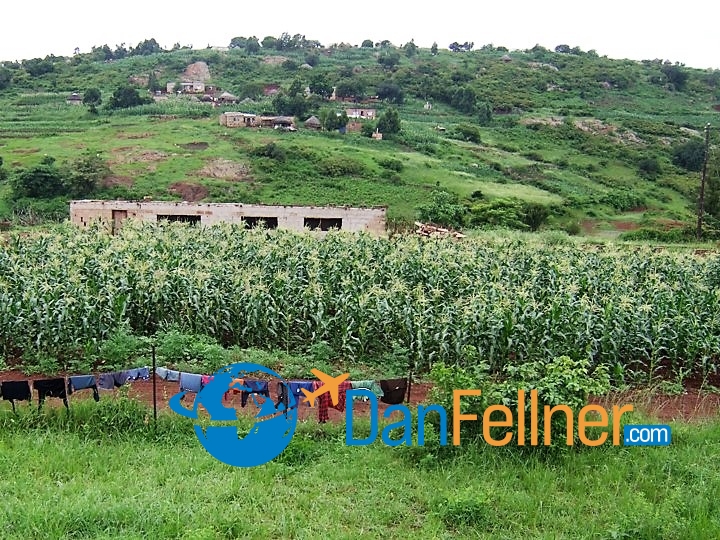
Swaziland scenery.
All we needed was a quick bathroom break (and to pay another $25 at the border crossing) and we were ready to head back to Maputo. Bob and I had to pay $1 to use a bathroom that was two-inches deep in water — at least we hoped it was water. Unfortunately for Linda, the women’s bathroom was out of order.
The Land Cruiser needed another push to leave the border area and when Dudley asked Linda if she wanted to stop at a hotel on the way back to use the facilities, she politely declined. We knew that each time we stopped, we might not be able to start.
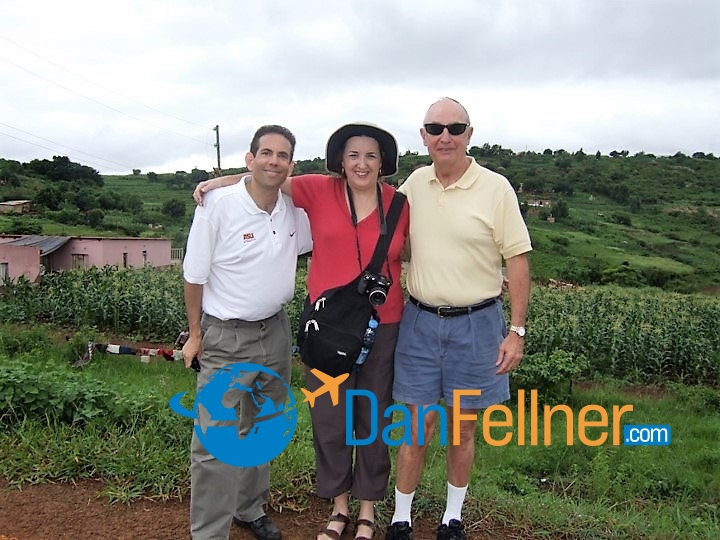
Our intrepid group standing firmly on Swazi soil.
With about one hour to spare, we arrived back at the ship. It had been a true African adventure and after a bit more turmoil and stress than we would have cared for, we had reached our destination and safely returned.
My Swaziland dream had come true. And I had set foot on the soil of another country, if only for a few minutes.
Now back on the ship, it was time for some grilled veal and a stiff drink.


